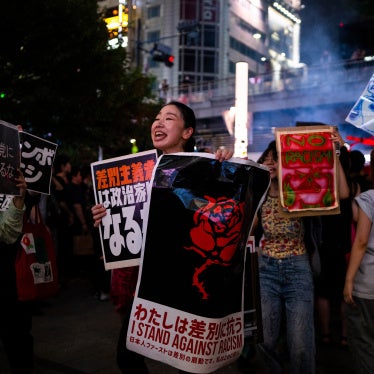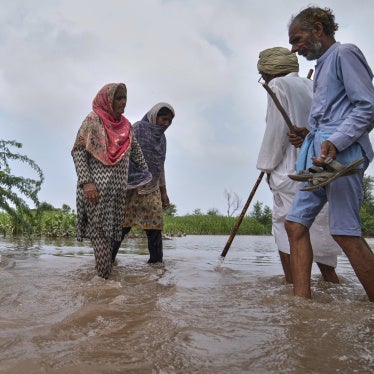(New York) -- Two international organizations appealed today for the release of farmers arrested for trying to petition Chinese authorities to end abuses linked to the Three Gorges Dam project. The four men, who were arrested after protesting coercion and corruption involved in resettling thousands of fellow farmers, may go on trial as early as next week. The appeal comes one day after the U.N. Commission on Human Rights refused to criticize China's human rights practices.
Human Rights Watch and Probe International called on diplomats in Beijing and international banks involved in financing the dam to urge the Chinese government to release the men and conduct a full, impartial, and transparent investigation into their charges of official malfeasance.
"Governments and banks around the world have helped finance the Three Gorges Dam," said Patricia Adams of Probe International. "They should speak up to ensure justice for whistle-blowers like the men from Gaoyang and for the people they represent."
The four farmers, He Kechang, Rang Chongxin, Jiang Qingshan, and Wen Dingchun, are among thousands of residents of Gaoyang township, Yunyang county, Chongqing municipality due to be resettled, as the county is in the middle of what will become the dam's reservoir area. Three of the men were arrested in mid-March after they had traveled to Beijing with petitions detailing systematic embezzlement of funds set aside for resettlement. The fourth was arrested in Gaoyang about the same time. All are reportedly being held in the Yunyang County police lock-up in Chongqing. They are expected to be tried at the end of April on charges of disturbing public order, leaking state secrets, and "maintaining illicit relations with a foreign country." The last charge is apparently a reference to their contacts with the international press in Hong Kong.
In early March, according to sources in the area, eight representatives of the thousands of soon-to-be resettled residents of Gaoyang had decided to travel to Beijing to speak out against misuse of resettlement funds by local officials. The officials had reportedly inflated the number of people to be resettled as well as the amount of land needed, thereby collecting more money from the central government. They also paid less than the amount promised to those forced to move, and complaints had filtered back to those still in Yunyang. The local police got wind of the proposed protest and on March 8, arrested Wen Dingchun, one of the would-be petitioners in Gaoyang. Four others reportedly fled. He Kechang led the remaining two to Beijing. The Yunyang county police tracked them down there, and on March 12, they were taken into custody and escorted back to Yunyang.
All four - the three arrested in Beijing and Wen Dingchun - have been in the police lock-up since. He Kechang has reportedly smuggled a message out that he has been ill-treated, but verification of the condition of the men has been impossible.
After the men left for Beijing, the police searched their homes. In He Kechang's home, they found copies of interviews he had given to the Hong Kong press and a letter to Jasper Becker, a well-known reporter from the Hong Kong-based South China Morning Post. He Kechang had earlier telephoned the paper to report Wen Dingchun's arrest.
"This case bears some resemblance to the recent arrests of Chinese-born academics," said Sidney Jones of Human Rights Watch. "In both cases, the people detained apparently had information on local conditions that they were trying to get out to a wider audience, the academics through scholarly publications, the farmers through petitions." Jones noted that corruption is hardly a state secret in China, but in the absence of freedom of expression or independent courts, ordinary citizens run a huge risk in revealing abuses by local authorities - including being charged with leaking state secrets.
Regulations approved by China's State Council in February were designed to reduce the possibility of corruption and coercion in connection with resettlement of people living around the Three Gorges Dam. At the time the regulations were issued, a leading Chinese expert on resettlement, sociologist Wei Yi, warned that the only way to ease corruption was to allow more public oversight and press scrutiny.








